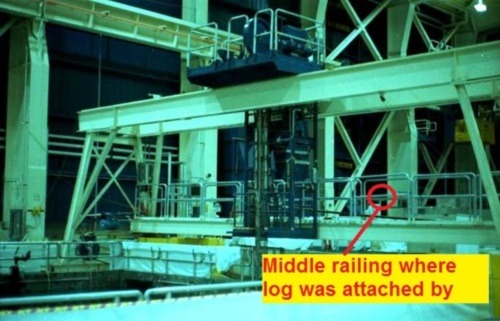
Following the fuel tag fiasco (Fission Stories #70) and the earlier, equally embarrassing, misadventure with a plastic booty (Fission Stories #69), the Tennessee Valley Authority (TVA) established a tracking program for anything that dropped into the reactor vessel or spent fuel pool at their Browns Ferry nuclear plant in Alabama. A log sheet was maintained on a metal clipboard tied to the refueling platform railing like shown in the figure above. Any time something fell into the water and could not be immediately retrieved, it was entered on the log sheet. When the item was later recovered, its removal was recorded on the log. At the end of the refueling outage, all of the unrecovered items on the lost article log had to be located and retrieved or analyzed.
One midnight shift in the early 1980s, the reactor engineer in the control room received a call from a worker on the refueling floor. The worker said that something had fallen into the reactor vessel. The reactor engineer directed the worker to record it on the log.
After a long silence, the worker confessed that the string broke and the clipboard had fallen into the water. The lost article log was lost in the reactor vessel. The reactor engineer directed that everything be stopped on the refueling floor until that clipboard was recovered.
Workers fished the clipboard from the reactor vessel within an hour. They transferred the information from the soggy, and slightly contaminated, log sheet to a fresh log sheet on another clipboard.
The good news is that from that moment on the clipboard and log sheet were maintained at a desk far removed from the water.
The better news is that the desk–so far–has not fallen into the water.
Our Takeaway
“S**t Happens” is the motto of those who repeatedly experience miscues like this one. Those who learn from others’ miscues would think carefully when evaluating a plan to tie the lost article log by string to the refueling platform railing.
They would think that the log might be dropped while being tied to or untied from the railing. They would think that pages from the log might slip into the water while being reviewed. They would think that the pen or pencil being used to record data on the log sheets might fall into the water. They would think that the desk far away from the pool’s edge is the better place for the log to start its life than being secured to the refueling platform’s railing.
All that thinking would preclude much explaining.
“Fission Stories” is a weekly feature by Dave Lochbaum. For more information on nuclear power safety, see the nuclear safety section of UCS’s website and our interactive map, the Nuclear Power Information Tracker.
